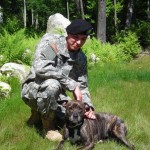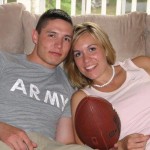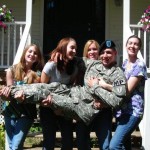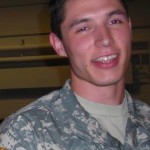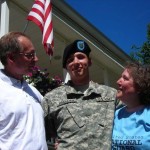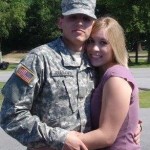Honoring and remembering Spc Seth Haapanen ~ NH Hero
Honoring and remembering Spc Seth Haapanen – Died 10-28-08 as a result of service to our country.
The following is an article from the National Guard article:
The last day Linda Haapanen saw her son Seth alive, he told her he wasn’t feeling well. So she went over and gave him a big hug. He squeezed her back. Then he rested his head in her arms. He turned to leave, walked down the stairs and said, “I love you, Mom,” just like he would always say. Less than 12 hours later, on October 28, 2008, Spc Seth Haapanen took his own life.
As a soldier with the NH National Guard 237th Military Police Company, he had returned home only 4 months earlier from a year-long deployment in Iraq.
For Seth’s family, his passing left unanswered questions about a harrowing overseas tour and its potential effects on his life at home. Although they may never know all the factors that lead to his death, through their story, their grief and their loss, they hope to send a message to soldiers that suicide is a permanent solution to a temporary problem. They want to encourage troops to get help – whether they think they need it or not. And they want the Army to take a tougher look at how soldiers suffering traumatic experiences are initially treated, counseled and later integrated to life back home.
GOING TO WAR
Seth grew up the middle child between four sisters on a 250-acre Christian campground in Monterey, Mass., where his parents served as camp directors. Loving and mischievous, he had a penchant for both picking on the girls and protecting them. His sister Gabriele, likes to tell the story about Seth’s youthful idea of fun – which included practicing his paintball aim by putting his little sisters in bright sweatshirts and telling them to “start running.” Seth spent his high school years homeschooled by his mother in Massachusetts, then moved to Alton in the summer of 2006. It was an environment filled with faith and service. He had dreams of joining the military and then becoming a local police officer or state trooper. So he sent away for anything the Army offered – free duffle bags, hats and T-shirts. His goal was to join the recently formed 237th Military Police Company at the NH National Guard. When he found out he made it into company, he was thrilled.
The night before he left for basic training in the spring of 2007, his mother, Linda asked him, “Seth, are you sure you want to do this?” Seth replied, “I’d rather fight them over on their own soil than to be fighting them here on our streets.” He was a protector, said his mother. “He liked making sure that people’s rights were carried out.” When the company was sent to Iraq in June of 2007, Haapanen left with the prayers and the pride of his family. He had just turned 20. With their departure, the 237th MP’s became one of the youngest units deployed in NH history.
A YEAR IN IRAQ
“This was our group of kids,” said retired Adjutant General Maj. Gen. Kenneth Clark at their Freedom Salute ceremony a year later.
At least half of the soldiers in the company were 21 or younger – and with increased demand for MP duties such as convoy security, route surveillance, handling of prisoners and police intelligence in Iraq – most had signed up anticipating an overseas tour. For motivated soldiers with a taste for action, the company provided the perfect outlet. Seth’s unit joined the 1132nd MP Company of the North Carolina Army National Guard in Rustamiyah and began training Iraqi policemen. Their schedule was grueling. They rose between 0400 and 0430, brushed their teeth, got suited up with gear and headed to the tactical operations center. They got their weapons from the arms room, set up the truck at the motor pool then headed out to visit their sector. Their day on the road started at Iraqi police stations where they worked on presence patrols and often hit the streets on foot. By 1800 they headed home to work out the stress of the day at the gym, go to chow, shower and play “Call of Duty” on the X-Box.
After four and a half months, Seth and three others moved north to Taji to fill out a platoon and support police training efforts there. The forward operating base, on the northern edge of Baghdad was more rural than Rustamiyah, with dustier streets and roaming stray dogs. Laid out against a landscape of beige sand, the cement walled base was as large as a city. Rows of CONEX aluminum trailers housed soldiers, two to a room where they slept between wood paneled walls in air conditioned comfort after days in persistent 100-degree heat.
Nicknamed “Happy” by his buddies, for his ever-present smile, Seth shared a room with medic Sgt. David “D.J.” Stelmat of Littleton. The platoon worked with seven Iraqi Police Stations – monitoring activity and patrolling the area with their counterparts, while training new policemen. On their dismounted foot patrols children would swarm the soldiers asking for treats and candy. Several times Seth called home and asked his parents to send toys and sweets so he could pass them out to little hands.
At first the deployment progressed smoothly. Things were quiet. Then in the spring, it started to get ugly. While on their way to a routine Iraqi Police Station visit, the road in front of Seth Haapanen’s vehicle exploded. The detonation blew out his front tire and sent shrapnel into team leader, Sgt. Robert Tabares, sitting to his side. The blast inside the enclosed vehicle rocked Seth’s head and ears. Tabares had to be medically evacuated, his wounds so severe that he was eventually sent back to the states. Only four days later the worst happened again. On March 22, the vehicle of Seth’s roommate, medic Sgt David Stelmat Jr., drove over an improvised explosive device. Stelmat, Sgt Thomas C. Ray II, the gunner, Sgt. David B. Williams, the team leader, and two Iraqi translators were all killed in the ensuing blast, which lifted the truck off the road, rocketing it into the air and igniting the vehicle’s pyrotechnics.
Seth arrived early at the scene and became part of the team that later dealt with and collected the five men’s remains. Within a 24 to 48 hour period Seth again went through the Army protocol for soldiers after an attack – a visit to the aid station for medical assessment, a unit debrief and a session with a mental health professional.
The families, waiting at home, heard that something had happened and were anxiously hoping for news. When Seth finally got a chance to call, he told his parents that his roommate had died. “I can’t do this anymore,” he said to his mom. “I can’t go out on another mission.”
His family encouraged him to get help. Eventually, they said, he went to talk to the Chaplain who told him he had Post Traumatic Stress Disorder (PTSD) and probably a Mild Traumatic Brain Injury (MTBI) and he should see a doctor. Haapanen was waiting to see someone, he told his parents, but in the meantime, he went out on another mission. The work of the war didn’t stop.
Neither did the casualties.
In April, Staff Sgt. Emanuel Pickett died. Then, under a week later, Sgt. Lance Eakes, who had moved to Taji to replace Stelmat, was killed.
The emotional toll was devastating for the entire unit. Seth’s friends said that his ever-present smile faded the day that Stelmat died. A little more than two months later on June 10, 2008, the 237th MPs arrived in Mississippi.
COMING HOME
They had come from a 24-hour world to 9 to 5 society – and the things that they brought back were real. The group went through demobilization at Camp Shelby, while soldiers and families urgently waiting to be reunited.
They moved through days of administrative and medical checks that mirrored their mobilization process. Each soldier’s data was checked and verified and their medical health documented. They also started their initial enrollment with the Veteran’s Administration (VA).
Unlike their active duty counterparts, however, when the 237th arrived in country, they still were not “home” which meant that declaring problems or issues while standing in line at Camp Shelby would ultimately delay their arrival back to New Hampshire. Seth made it to home just in time to surprise his sister Gabriele at her graduation from Prospect Mountain High School in Alton. He walked up on the stage in his uniform, shielded by sunglasses, to a standing ovation from the crowd. As he and his sister hugged, the audience cried. To the outside world, he looked tall and tan and serious, but inside the headaches were killing him. He seemed emotionally fine to his family, friends and fellow soldiers, who were overjoyed to have him home.
They wonder now if his reintegration should have been lengthened. In hindsight his mother wishes that soldiers would be forced to take more time checking in – and being checked.
“They need to be slowed down,” Linda said. “They are all going to say they are fine, but…” Upon their arrival in Concord, the group completed another mandatory Reverse Soldier Readiness Process (RSRP) as part of the Yellow Ribbon Reintegration Program.
The three-day program was aimed at catching problems that might slip by during the demobilization phase in Mississippi. During the program one day was spent on personnel actions to make sure a soldier’s administrative paperwork was in order, their health insurance ready, their pay up to date and their legal issues addressed. The second day was spent on medical and dental checks. Every soldier was also required to meet with a representative for a mandatory discussion about counseling. The last day was spent on soldier and family wellness and included tools for re-integration. The last phases of the Yellow Ribbon program, dubbed “30-60-90,” were weekend meetings 30, 60, and 90 days after returning from deployment. The days were aimed at re-acquainting family members, talking about substance abuse and dealing with stress and anger management. Classes were followed by final medical exams and a post deployment health reassessment to catch potential mental health problems. The goal was to lengthen the reintegration process in order to catch issues that may not be evident on their first weekend home.
His parents say that Seth talked to them about listening to a lecture about PTSD while sitting in a circle of soldiers. Many times they didn’t open up about their experiences. “The first thing that soldiers do is to look at the [combat] patch to see if the one who’s facilitating can really relate to what they’ve experienced,” said his father. “They want facilitators who can relate to what they are going through.” Some also say that soldiers can’t be expected to readjust according to a schedule. The work of processing overseas experiences and reconciling them with life at home, may take longer than 90 days. Most soldiers say their deployments left them permanently changed.
Seth’s family was ecstatic to have him back. He seemed happy. He didn’t show signs of distance, anger or sadness. But he was having terrible headaches and was in serious pain. He took a post-deployment mental health screening with the VA in June where his Traumatic Brain Injury was noted. He also tested positive for PTSD. He answered “yes” to questions such as “Have you ever had any experience that was so horrible or upsetting that, IN THE PAST MONTH, you: Have had any nightmares about it or thought about it when you did not want to? Tried hard not to think about it or went out of your way to avoid situations that remind you of it? Were constantly on guard, watchful, or easily startled? Felt numb or detached from others, activities, or your surroundings?”
But it wasn’t until September that he talked to the VA again, calling with a headache that “feels like a sledge hammer on my head.” Around this time he also called his father and said, “Dad, I nearly blacked out while I was driving, the headache was so bad.” But he made it up to his room and he was just going to try to sleep it off. A few days later the pain was still so severe, he went to the emergency room at Concord Hospital. His family said they put him on an IV and told him it was a bad migraine. “The cycle, that we understand was happening, was with the headaches,” said his father. “He wasn’t getting good sleep and the times when he would fall asleep he would wake up many times with nightmares of what he saw.”
By October 21 when he went to the VA for a mental health diagnostic. He was having trouble working because of headaches, blurred vision, pain and light sensitivity. His memories, dreams and flashbacks were overwhelming him and he had begun using increasing amounts of alcohol to cope with his feelings and inability to sleep. He told his parents that the VA told him to take baby steps “to turn off the TV [at night] and turn the clock radio around,” Linda said.
“Maybe in Seth’s mind it was too little too late?” his father, Rich said. His VA records state in an “assessment of danger to self” that he posed “no significant risk.” He was scheduled for a return visit six days later but he never showed up. [Double Check THIS] On October 27, 2008, Seth went to Alton to check mail and visit with his mother. It was the last time she saw him.
THE AFTERMATH
“When you think about some of the classic things that someone does before they commit suicide – those weren’t there. Giving things away for example,” said Rich. “Those weren’t there. So it just wasn’t on our radar screen for us to be concerned in that way.”
At Seth’s funeral Rich stood at the church alter and made a plea to soldiers coming home from overseas deployments to get help. And if they feel like they are not getting the response they need, they should find someone who will go to bat for them. The family wonders if, for Seth, the help was too slow in coming? They want to encourage those in charge to find ways to work harder at diagnosing problems and following through with treatment, sooner rather than later. They also think there should be more time taken with out-processing and more focus on recruiting facilitators with combat experience. “The military needs to encourage soldiers to get help,” said Seth’s father Rich. Since Seth’s death the N.H. National Guard has been part of a national “Stand Down” on suicide prevention that brings training to every soldier in the organization. It is a move that leaders hope will prevent the loss of another soldier. The guard has also appointed a full-time suicide prevention manager and hired its first Director of Psychological Health. But for his family, his friends, and his fellow soldiers, it has been a time of tears. Tears full of all the moments of future loss – graduations, marriages – all the joy that they would never share.
His parents can’t help but ask the what-ifs. They accept that God is in control and that God knows – but that peace also contains a terrible irony. “God is a sovereign God, ultimately in control of all things at all times. God has a plan. How do you reconcile that?” Rich asks. “I can’t. But I still believe in a sovereign God.” His sisters are afraid they might forget him. And so they got tattoos, each one different, all bearing his initials.
They buried him near his childhood home next to his grandfather. There’s a picture from that moment – a photo of his sisters bowed down in grief next to his grave and from the corner on high, a streak of sunlight, breaks out in a solar ring.

